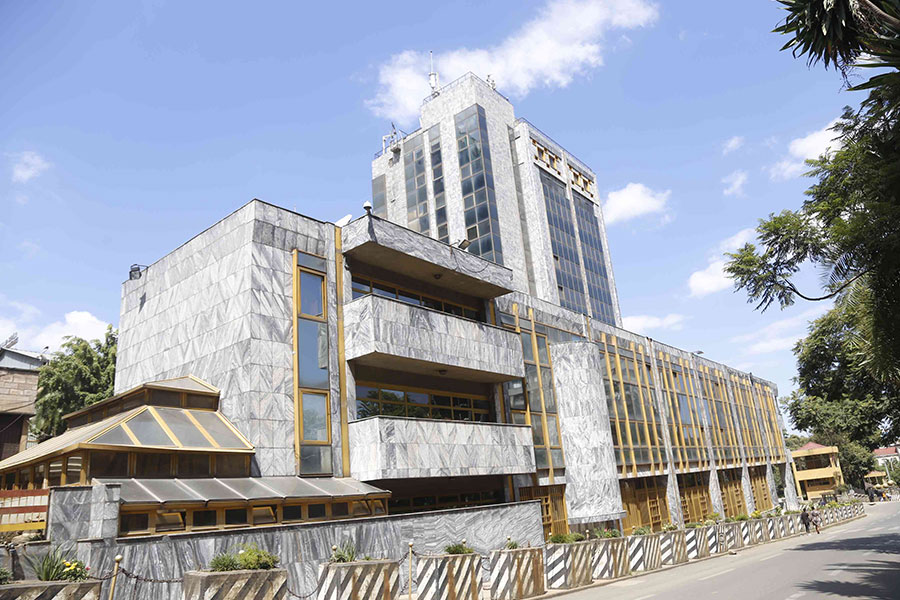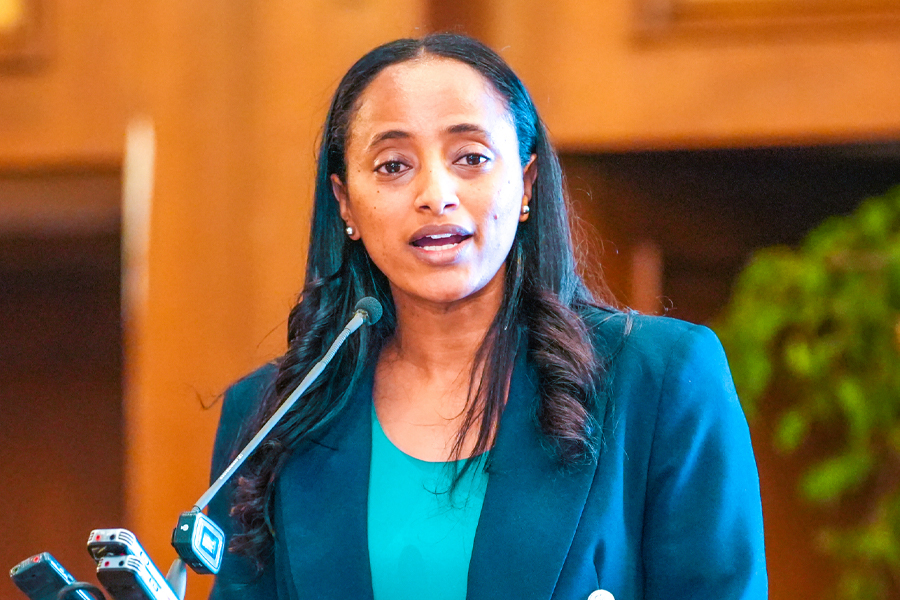
Commentaries | Nov 05,2022
Apr 30 , 2021
By Kamil Abdu Oumer
The recognition of interest-free finance by the government has led to a few notable individuals raising some concerns. They expressed their fear that IFBs may widen political and social divisions in the country. They also questioned the constitutionality of IFB in Ethiopia, citing the secular nature of the Ethiopian state. These are, however, misconceptions in need of redressing, writes Kamil Abdu Oumer (kamillaw2009@gmail.com), a PhD Candidate in Commercial Law, MSc in Islamic Finance and staff member at Wollo University School of Law.
Two years ago, the National Bank of Ethiopia (NBE) allowed the operation of full-fledged interest-free banking (IFB) business for the first time in the country's history. Following the directive, many full-fledged interest-free banks began their formation process, and two of them have already received operational licenses. About half a dozen existing conventional banks also opened their own “full-fledged interest-free branches.”
However, dissenting voices, including notable business leaders, questioned the virtue of these banks. They contended that it is unwise to authorise full-fledged IFBs for they may promote social divisions and IFBs may be against the secular foundation of the federal republic.
But the operation of interest-free banking business has little to do with promoting social division and the principle of secularism. In fact, the government has a constitutional obligation to create favourable conditions for the development of interest-free financial institutions in the country.
First, a little bit of history. After two decades of popular demand, the government opened the door for IFB in 2008. The Banking Business Proclamation provided that “the National Bank may issue directive to regulate banking businesses related to noninterest-bearing deposit mobilisation and fund utilisation.”
Eager to join the financial market, a full-fledged IFB, ZamZam Bank (under formation now), completed selling shares even before the central bank issued the long-expected directive. However, IFB was restricted to window service, forcing ZamZam to refund the mobilised fund to contributors. A number of existing conventional banks, nonetheless, have been providing IFB window service since the early 2010s.
Interest-free finance (IFF) is expanding its coverage throughout the world. With the motive of promoting financial inclusion and attracting foreign investment, nations have been accepting IFF as part of their financial system. Global financial institutions like the International Monetary Fund (IMF) and the World Bank also recognise it as an alternative financial system.
With the issuance of the directive that licenses and authorises IFB, Ethiopia has also adopted a dual banking system. Hence, 12 conventional banks are providing IFB window services throughout the country. Over 66.3 billion Br have been mobilised through interest-free fund mobilisation schemes by the end of last September as a result. In the same period, over 13.5 billion Br has been disbursed through IFB financing schemes. Several full-fledged IFBs are also in the process of joining the industry.
A few notable individuals have raised some concerns over the authorsation of full-fledged IFBs in Ethiopia. They expressed their fear that IFBs may widen political and social divisions. They also questioned the constitutionality of IFB in Ethiopia, citing the secular nature of the Ethiopian state.
The primary opposition against IFBs has been on their “sectarian” nature. Allowing IFBs in the already ethnically segregated banking sector in the country poses an additional challenge to the industry, it is claimed. This is, however, partly due to misconceptions.
IFB is not restricted to any faith. It is a banking system that complies with the teaching of Sharia Law but is open for everyone to establish or benefit from it. Using principles from this Law to advance the living conditions of the people, if that works, is the right of everyone as religions are the common heritage of humankind. Practically also, IFBs across the world have a significant number of non-Muslim customers, managers and owners.
IFBs in Ethiopia are not discriminatory. In fact, the twelve conventional banks providing IFB window service, of which six have opened full-fledged interest-free branches, are owned by shareholders from all sections of the community. In addition, IFB windows have a significant number of customers from all walks of life. The full-fledged IFBs under formation are also floating their shares in the open and advertising job vacancies openly so that everyone with the required skill set can apply. Therefore, IFBs are not discriminatory.
Of course, the very nomenclature of IFB services may throw people off. “Islamic” terms to denote IFB products and the tendency of the industry participants in using certain types of marketing (promotion) strategies has brought on criticism. Operation in line with the principles of Sharia Law is the very core of interest-free finance and cannot be excluded from the definition of IFB. But the usage of “Islamic terminologies” to designate financial products and financial institutions, however, can and should be replaced by local terminologies. In any case, however, the discomfort such terminologies may create is not comparable to the advantages IFBs can bring to the inclusive development of the country.
Another criticism has been that allowing IFBs is contrary to the principles of a secular state.
Ethiopia is a secular state in which “the state shall not interfere in religious affairs and religion shall not interfere in state affairs.”
As there is neither subordinate law nor judicial review detailing the type and extent of secularism in the constitution, secularism has been abused in different contexts. But what is evident from the constitutional provision is that the state should not force any entity to provide or use interest-free or interest-based financial services. Neither should the state tolerate discrimination among citizens in this regard. Anyone who wants to provide or benefit from IFB services should be free to do as such.
Freedom of religion is also recognised under the constitution: everyone is entitled “to hold or to adopt a religion or belief of his choice.” The International Covenant on Civil and Political Rights also explains that this right includes “personal conviction and the commitment to religion or beliefs.”
Thus, since interest-based financial services are prohibited within the religion of Islam, it is obvious that everyone has the right to commit to such teachings.
In the same token, the right to development is enshrined under Ethiopia’s constitution. The provision prescribed that the Ethiopian people have the right to improved life and development.
In addition, the constitution imposes a positive obligation on the government “to ensure that all Ethiopians get equal opportunity to improve their economic condition and to promote equitable distribution of wealth among them.”
In the present world, developing and improving one’s life is almost impossible without access to finance, something that is compounded when followers of a certain faith can not find alternative financial services to interest-based banking.
Further, the constitution recognises that “every Ethiopian has the right to engage freely in economic activity and to pursue a livelihood of his choice anywhere within the national territory.”
Thus, every Ethiopian, including those who have the conviction to avoid an interest-based financial system, has the right to engage in the financial sector and earn their living.
The demand for interest-free finance came from the community; it is not a government-induced project. Since 1995, the diaspora and some educated groups have repeatedly raised the issue. They even prepared proposals for the introduction of IFB in the country. These all are the endeavours of citizens for economic development. The constitution has expressly provided that the government has “the duty to support the initiatives of the people in their development endeavors.” Therefore, providing a regulatory environment for IFB in Ethiopia is the constitutional obligation of the government.
The global experience also shows that IFB promotes financial inclusion and development. The experience of countries such as France, China, the United States, the United Kingdom, Turkey and Singapore shows that allowing the operation of IFB is not contradictory to the principles of secularism.
PUBLISHED ON
Apr 30,2021 [ VOL
22 , NO
1096]


Commentaries | Nov 05,2022

Radar | Aug 27,2022

Fortune News | Dec 10,2022

Fortune News | May 24,2025

Radar | Apr 27,2025

Commentaries | Dec 16,2023

Radar | Mar 25,2023

Radar | Nov 23,2019

Fortune News | Jan 30,2021

Fortune News | Jul 20,2019

My Opinion | 131497 Views | Aug 14,2021

My Opinion | 127853 Views | Aug 21,2021

My Opinion | 125831 Views | Sep 10,2021

My Opinion | 123461 Views | Aug 07,2021

Dec 22 , 2024 . By TIZITA SHEWAFERAW
Charged with transforming colossal state-owned enterprises into modern and competitiv...

Aug 18 , 2024 . By AKSAH ITALO
Although predictable Yonas Zerihun's job in the ride-hailing service is not immune to...

Jul 28 , 2024 . By TIZITA SHEWAFERAW
Unhabitual, perhaps too many, Samuel Gebreyohannes, 38, used to occasionally enjoy a couple of beers at breakfast. However, he recently swit...

Jul 13 , 2024 . By AKSAH ITALO
Investors who rely on tractors, trucks, and field vehicles for commuting, transporting commodities, and f...

Jun 28 , 2025
Meseret Damtie, the assertive auditor general, has never been shy about naming names...

Jun 21 , 2025
A well-worn adage says, “Budget is not destiny, but it is direction.” Examining t...

Jun 14 , 2025
Yet again, the Horn of Africa is bracing for trouble. A region already frayed by wars...

Jun 7 , 2025
Few promises shine brighter in Addis Abeba than the pledge of a roof for every family...

Jun 29 , 2025
Addis Abeba's first rains have coincided with a sweeping rise in private school tuition, prompting the city's education...

Jun 29 , 2025 . By BEZAWIT HULUAGER
Central Bank Governor Mamo Mihretu claimed a bold reconfiguration of monetary policy...

Jun 29 , 2025 . By BEZAWIT HULUAGER
The federal government is betting on a sweeping overhaul of the driver licensing regi...

Jun 29 , 2025 . By NAHOM AYELE
Gadaa Bank has listed 1.2 million shares on the Ethiopian Securities Exchange (ESX),...